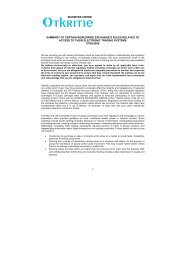OSL Terms of Business for Professional Clients and ... - Otkritie
OSL Terms of Business for Professional Clients and ... - Otkritie
OSL Terms of Business for Professional Clients and ... - Otkritie
You also want an ePaper? Increase the reach of your titles
YUMPU automatically turns print PDFs into web optimized ePapers that Google loves.
<strong>Otkritie</strong> Securities Limited<br />
<strong>Terms</strong> <strong>of</strong> <strong>Business</strong> For Pr<strong>of</strong>essional <strong>Clients</strong><br />
<strong>and</strong> Eligible Counterparties<br />
make further payments in certain circumstances over <strong>and</strong> above any amount paid when you entered the<br />
contract.<br />
Limited Liability Transactions<br />
The extent <strong>of</strong> your loss on a limited liability Transaction will be limited to an amount agreed by you be<strong>for</strong>e you<br />
enter into the Transaction. The amount you can lose in limited liability Transactions will be less than in other<br />
margined Transactions, which have no predetermined loss limit. Nevertheless, even though the extent <strong>of</strong> loss<br />
will be subject to the agreed limit, you may sustain the loss in a relatively short time. Your loss may be limited,<br />
but the risk <strong>of</strong> sustaining a total loss equivalent to the amount agreed is substantial.<br />
Collateral<br />
If you deposit collateral as security with us <strong>for</strong> Transactions you enter, the way in which it will be treated will<br />
vary according to the type <strong>of</strong> Transaction <strong>and</strong> where it is traded. There could be significant differences in the<br />
treatment <strong>of</strong> your collateral, depending on whether you are trading on a recognised or designated investment<br />
exchange, with the rules <strong>of</strong> that exchange (<strong>and</strong> any associated clearing house) applying, or trading <strong>of</strong>fexchange.<br />
Collateral may lose its identity as your Property once dealings on your behalf are undertaken,<br />
particularly where you transfer the title to such collateral <strong>and</strong> ‘right to use’ provisions apply. Even if your<br />
dealings should ultimately prove pr<strong>of</strong>itable, you may not get back the same Assets which you deposited, <strong>and</strong><br />
may have to accept payment in cash.<br />
Extended Hours Trading<br />
Increased trading opportunity means increased ability to react to news <strong>and</strong> earnings reports that occur during<br />
pre- <strong>and</strong> post-market sessions. However the extended hours trading involves material trading risks, including<br />
the possibility <strong>of</strong> the following:<br />
(a) Risk <strong>of</strong> timing <strong>of</strong> order entry. All orders entered <strong>and</strong> posted during extended-hours trading sessions<br />
must be limit orders. You must indicate the price at which you would like your order to be executed. By<br />
entering the price, you agree not to buy <strong>for</strong> more or sell <strong>for</strong> less than the price you entered, although your order<br />
may be executed at a better price. Your order will be executed if it matches an order from another investor or<br />
market pr<strong>of</strong>essional to sell or purchase on the other side <strong>of</strong> the transaction. In addition, there may be orders<br />
entered ahead <strong>of</strong> your order by investors willing to buy or sell at the same price. Orders entered earlier at the<br />
same price level will have a higher priority. This means that if the market is at your requested price level, an<br />
order entered prior to your order will be executed first. This may prevent your order from being executed in<br />
whole or in part.<br />
(b) Risk <strong>of</strong> execution pricing. For extended-hours trading sessions, quotations will reflect the bid <strong>and</strong> ask<br />
currently available through the utilized quotation service. The quotation service may not reflect all available<br />
bids <strong>and</strong> <strong>of</strong>fers posted by other exchanges, <strong>and</strong> may reflect bids <strong>and</strong> <strong>of</strong>fers that may not be accessible through<br />
<strong>OSL</strong> or respective trading partners. This quotation montage applies <strong>for</strong> both pre- <strong>and</strong> post-market sessions.<br />
Not all systems are linked; there<strong>for</strong>e you may pay more or less <strong>for</strong> your security purchases or receive more or<br />
less <strong>for</strong> your security sales through an exchange than you would <strong>for</strong> a similar transaction on a different<br />
exchange.<br />
(c) Risk <strong>of</strong> lower liquidity. Liquidity refers to the ability <strong>of</strong> market participants to buy <strong>and</strong> sell securities.<br />
Generally, the more orders that are available in a market, the greater the liquidity. Liquidity is important<br />
because with greater liquidity it is easier <strong>for</strong> investors to buy or sell securities, <strong>and</strong> as a result investors are<br />
more likely to pay or receive a competitive price <strong>for</strong> securities purchased or sold. There may be lower liquidity<br />
in extended hours trading as compared to regular market hours. As a result, your order may only be partially<br />
executed, or not at all.<br />
(d) Risk <strong>of</strong> higher volatility. Volatility refers to the changes in price that securities undergo when trading.<br />
Generally, the higher the volatility <strong>of</strong> a security, the greater its price swings. There may be greater volatility in<br />
37



